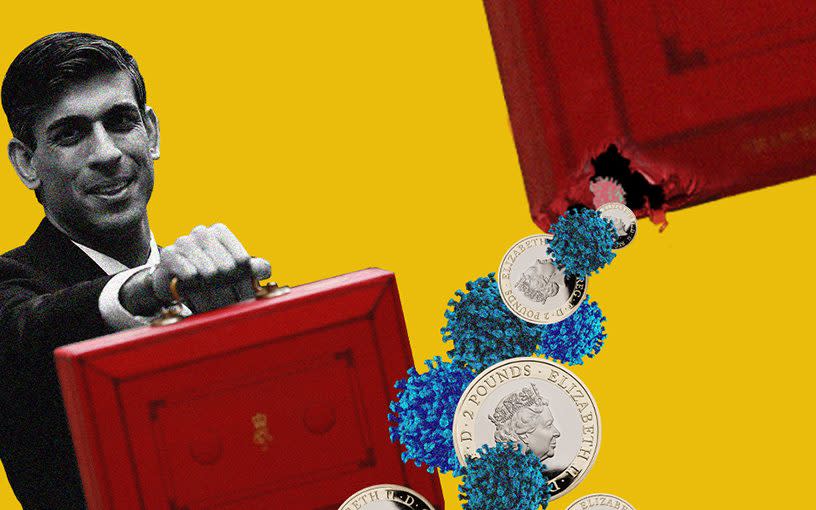Sunak expected to resist spending spree as debt interest hits record £8.7bn

Rishi Sunak is expected to push back against demands for a post-Covid spending spree after rising inflation and the burden of pandemic support measures sent interest payments on Britain's debt to a record high.
The country spent £8.7bn on servicing its debts in June, enough to fund the Department for Business for a year and equivalent to £312 for every British household.
There is growing alarm in the Treasury that rising inflation could trigger a further jump in interest payments in coming months as the Chancellor seeks to resist further uncosted spending pledges by Boris Johnson.
Samuel Tombs, of Pantheon Macroeconomics, said: "We do not sense that the Conservatives are willing to spend the large sums that would be needed to deliver on their 'levelling up' pledge."
Last night ministers confirmed a 3pc pay rise for NHS staff which will cost hundreds of millions of pounds a year.
Britain is particularly exposed to rising inflation because almost one-quarter of the nation’s £2.2 trillion debt is linked to the retail price index (RPI) - a far higher share than in any other advanced economy. The RPI rose by 3.9pc in June, up from 1.1pc a year earlier.
The Government borrowed another £22.8bn in June overall, taking the total national debt to £2.2 trillion or 99.7pc of GDP - the highest as a share of output since 1961.
In the first three months of this financial year, the Government has had to pay £17.9bn to service what it owes - almost 60pc more than during the same period of 2020.
At present, the country is still benefitting from ultra-low interest rates and a compliant Bank of England which has supported the bond markets through its vast money-printing programme.
But mandarins fear disaster if Threadneedle Street hikes interest rates to combat inflation, with a single percentage point increase adding an estimated £21bn to the country's annual bill.
Richard Hughes, chair of the Office for Budget Responsibility, said that rising prices could prompt the Treasury to consider cutting back its use of index-linked bonds, reducing the risk posed by inflation but disappointing savers and pension funds which rely on the instruments to preserve the value of their cash.
He said: “Inflation-linked debt involves the Government taking on more and more inflation risk from the rest of the economy."
The bonds are popular with savers and is cheap for the Treasury if inflation stays low, Mr Hughes told MPs on the Treasury Select Committee. But he added: “If you see rising inflation in the context of stagnant growth, that is a big risk.”
The public finances are increasingly exposed to changes in interest rates.
Mr Hughes said: "In the past the Government had more time to respond to rising interest rates when it had a median maturity seven years, than now when it has a median maturity of two years.
"It means the rest of public spending and tax would need to respond more quickly if interest rates start to rise."
Alison Ring at the Institute of Chartered Accountants in England and Wales said the bigger debt puts the nation increasingly at risk.
She said: “Thee public finances [are] more vulnerable to changes in interest rates and reducing the fiscal headroom available to the Chancellor as he seeks to navigate the economy out of the pandemic."
Bounce back?
However, the June spending figures also included signs that the economy is bouncing back. Government receipts climbed to £62.2bn for the month, up from £9.5bn a year earlier with income tax, fuel duty and VAT all giving the Chancellor sharply higher revenues as the reopening takes hold and economic activity ramps up.
Stamp duty also rebounded to bring in £1.3bn, the third-highest monthly haul on record, indicating that the housing market was still going strong before a reduction in the tax was partially phased out at the end of the month.
Expenditure nonetheless remained high. Central government bodies spent £84.1bn in the month, £2.5bn more than it was a year ago despite all of the progress on the virus and the economy in the past 12 months. A large share of this is thought to be the cost of the NHS Test and Trace programme, as well as the vaccines.
Emergency economic schemes such as furlough are winding down but remain a serious cost.
Job Retention Scheme payments totalled £6.7bn in the past three months, down three-quarters from more than £28bn in the same period of 2020.
self-employed support, which does not require recipients to be completely off work, only dipped by one-quarter to £5.5bn.
Borrowing undershoots forecast
So far this financial year the Government has borrowed £69.5bn, compared to £88.4bn predicted by the Office for Budget Responsibility when the Chancellor was putting together his Budget in March.
This indicates that the recovery is running ahead of track, but Ruth Gregory at Capital Economics does not expect Mr Sunak to use it to change his plans to raise some taxes.
She said: “While debt service costs will probably stay higher than the OBR estimated over next few years, the public finances should continue to reap the benefits of a faster and fuller recovery in GDP than the OBR expects, meaning that the deficit should still fall faster."
“That said, we suspect the Chancellor will bank any improvement in the deficit rather than scale back the planned tax hikes and spending cuts set to hit the economy. At least by 2022/23, the economy should be strong enough to cope with it.”
Mr Sunak said it was right to "ensure debt remains under control in the medium term, and that’s why I made some tough choices at the last Budget to put the public finances on a sustainable path”.

 Yahoo Finance
Yahoo Finance 